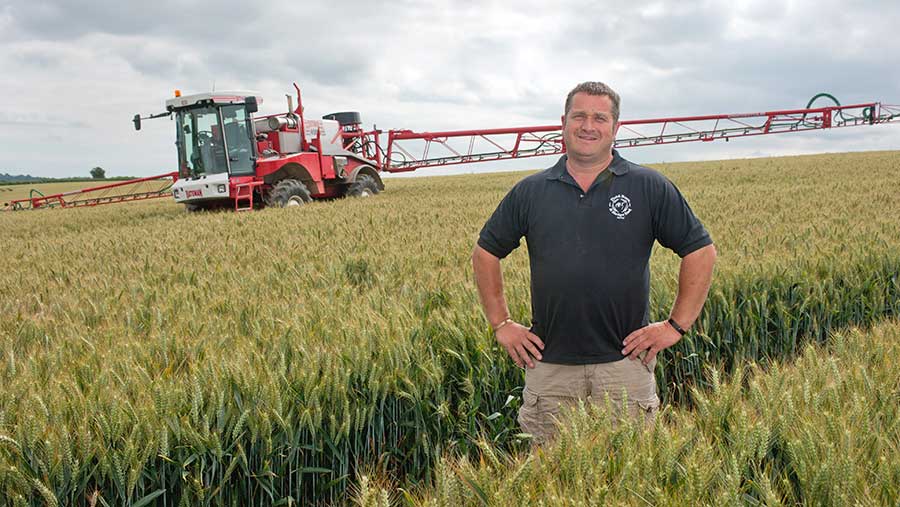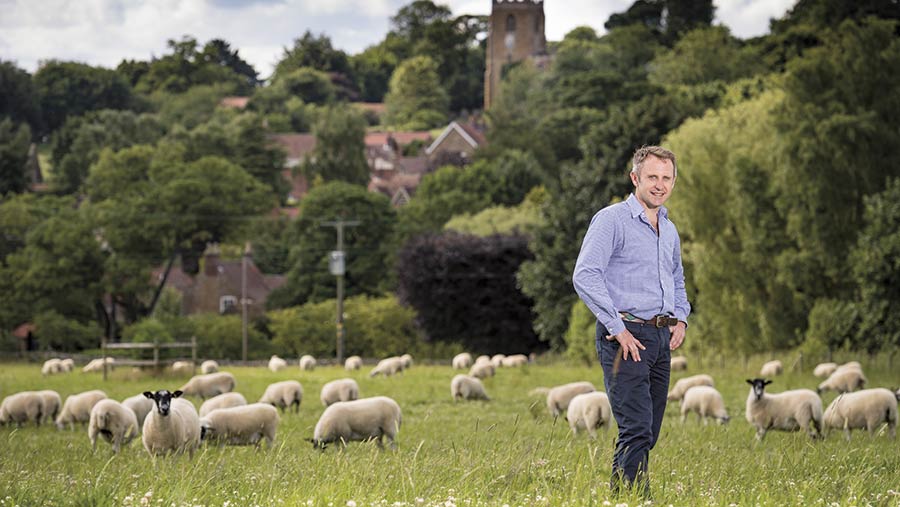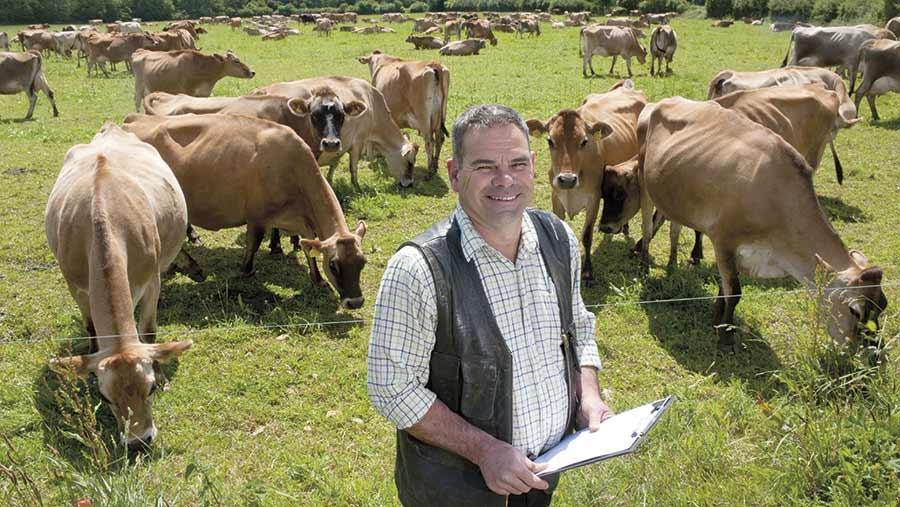2017 FW Awards: Farm Manager of the Year finalists
The Farmers Weekly Awards 2017 finalists have been announced and the judges have visited each of the finalists for a three-hour interview and tour.
These three farm manager finalists are all at the top of their game seeking out premium prices for their products, pushing up yields in a sustainable way and making environmental improvements to boost wildlife and bird numbers on their farms.
See also: Book you table for the Farmers Weekly Awards 2017 night
The 2017 Farm Manager finalists are:
- Scott Bagwell, Field Barn Farm, Winterborne Whitechurch, Dorset
- Chris Baylis, Hall Farm, Stainton le Vale, Lincolnshire
- Paul Redmore, Neston Home Farm, Corsham, Wiltshire
The judges are
- Tim Pratt, 2016 Farm Manager of the Year
- David Jones, Farmer Weekly deputy arable editor
- David Watson, independent judge
Scott Bagwell, Field Barn Farm, Winterborne Whitechurch, Dorset

Scott Bagwell © Hugh Nutt
Markets
Farm facts
- Farms 860ha with 300 dairy cows, youngstock, 700 ewes, while growing winter wheat and oats, oilseed rape and spring barley.
- The dairy Holstein-Friesian herd averages 10,900 litres a cow a year, with butterfat at 3.98% and protein at 3.34%.
- Some 11% of the farm is in wildflower bird and pollen mixes, and the farm includes 47ha of woodland.
Scott Bagwell’s aim is to sell all his farm’s output on premium-priced contracts and extend his environmental schemes to prepare for the potential shockwaves from Brexit.
Milk is sold on a much-envied Marks and Spencer contract, winter oats head to Jordans and milling wheat to Hovis as he looks to squeeze the best prices for the farm’s output.
The milk contract, agreed in 2013 for the farm’s 300-strong Holstein/Friesian herd, is key to the farm’s success, providing half its turnover at a 20% price premium to the general milk market.
“Our long-term desire is to sell all the farm’s output on premium-price contracts, as without the M&S deal our milk production would be loss-making,” he said.
As farm subsidies come under pressure and are more linked to environment work while Britain prepares to leave the European Union, Scott is preparing by planting more wildflower margins to attract birds and insects.
Production
Another nearby farm was bought in 2012, bringing the estate to 860ha. Scott discontinued the farm shoot there, as some of the best land was taken up with game cover. This move led to a massive recovery in wildlife, such as brown hares and birds of prey.
Annual milk yields have risen to 10,900 litres a cow, and the M&S contract will see a 1.7p/litre rise to 32.9p/litre in August, which is well ahead of his cost of production at 27.6p/litre.
“A price rise of 1p/litre means £30,000 for us, while the cows are an underestimated resource in pushing arable yields,” he says.
Staff
Scott manages a team of seven. He sees them as the most important resource that allows the farm to run 300 dairy cows and 700 ewes and grow winter wheat, winter oats, spring barley and oilseed rape.
All staff attend training courses where appropriate, while the farm’s two Polish staff members also received language training.
“We have a fantastic team who all know how to plough fields and also cope with cows in trouble calving,” he says.
The judges liked
- The farm has integrated very good arable and livestock systems with good environmental measures.
- Every area of the farm is used, from steep slopes to the good arable land and rich grassland.
- There is a holistic approach to the farming enterprise by using manures to boost crop yields.
Chris Baylis, Hall Farm, Stainton le Vale, Lincolnshire

Chris Baylis ©Jim Varney
Markets
Farm facts
- The Lincolnshire estate farms 3,600ha, growing wheat, barley, oilseed rape and sugar beet. Chris also manages a 2,400ha estate in Berkshire for the same family.
- There is no drying or long-term grain storage, so the farm is a member of co-operative Woldgrain, which circulates end-user contracts to members.
- The farm is looking to introduce grass leys to integrate the arable and livestock enterprises more fully.
Chris Baylis’ aim is to enable the rolling Lincolnshire Wolds estate he manages to survive profitably in a likely lower-subsidy era as Britain leaves the European Union.
He is improving crop yields, forging closer relationships with retailers and other end users and boosting his environmental credentials to succeed in this brave new world.
His beef is destined for Waitrose, malting barley goes to brewer Molson Coors and wheat is sold to the nearby Vivergo biofuel plant in Hull for a premium feed wheat price.
“Our long-term aim is to make the farm business sustainable in a post-subsidy era, in part by building relationships with end users and moving away from producing just commodities,” he says.
The estate is now just profitable before subsidy as he has stemmed losses from the beef enterprise and simplified the sheep operation in his six-year tenure.
Production
Chris arrived at the estate, owned by Sir Richard Sutton, in 2011 and looked to boost crop yields by variable seed and fertiliser rates, improve cultivations and use separate rotations for the light Wold land and heavy clays near the River Humber.
He introduced a mix of ploughing, minimum tillage and direct drilling and aims to cut the reliance on pesticides while improving the health of the soil.
Winter wheat yields have rise from 7.2t/ha to 9.4t/ha on the chalky Wold soils in five years and the variable production costs have been trimmed to £55/t.
Aberdeen Angus bulls are now used on the 120-strong Lincoln Red suckler herd to win a 40p/kg Waitrose beef premium, and now the once loss-making cattle make a 20p/kg profit.
A 1,200-head Mule ewe flock was sold off, and six-month-old gimmer Mule lambs were bought in and kept for a year to be sold as breeding stock, turning in a profits of £18 a head after costs.
Staff
Chris is head of farming for both the family’s Lincolnshire and Berkshire estates, some 180 miles apart. He also manages a 10-strong team on the most northerly estate.
He meets up with his Lincolnshire staff each morning and at a weekly meeting to share the strategy and objective of the estate.
The team, with a range of ages, all have annual appraisals, which provide a basis for a bonus scheme that rewards staff with up to 15% of their annual pay.
Chris’ working farm manager, Malcolm Vaughan, has been on the farm for 30 years and provides very useful local knowledge to the team.
The judges liked
- A careful investment strategy to meet benchmarked commercial returns on capital employed.
- Using a native cattle breed to produce an end product that the consumer wants and making the enterprise profitable.
- The farm has integrated very good arable and livestock systems with good environmental measures.
Paul Redmore, Neston Home Farm, Corsham, Wiltshire

Paul Redmore ©Hugh Nutt
Markets
Farm facts
- The 580ha farm has 300 dairy cows, 150 youngstock, 250 sheep and 50 beef cattle alongside 200ha of arable crops including wheat, oats and triticale.
- Some 80-90% of the milk is split equally between Ivy House Farm, which supplies London stores and coffee shops, and also Lye Cross Farm – run by the Alvis family – to make cheddar cheese.
- The rest of the milk is sold to an artisan cheese-maker on the farm and a new ice-cream venture, also on the farm estate.
Paul Redmore sits down with his team every morning to drink frothy coffee to check whether the organic Jersey milk from the morning’s milking is just right for top-end London coffee bars.
Discerning baristas at the like of upmarket Monmouth Coffee want just the right amount of froth on their cappuccinos and are prepared to pay nearly twice the open market price for top-quality milk.
Every drop of milk from the 300-strong herd ends up with a specific user, whether it is liquid milk to Harrods and Selfridges, cheddar cheese for the US and Korea, as well as the froth for the capital’s coffee lovers.
Farm manager Paul and his three-strong team on the Wiltshire estate of the Fuller family are committed to organic milk, as it sells for 45p/litre, compared with 27-28p/litre from the big processors.
“Organic milk is a growth market with low volatility, and we need to avoid volatile markets with Brexit around the corner,” he says.
Production
When Paul arrived as farm manager three-and-a-half years ago, there was a need to increase the income from the 580ha farm, which has been totally organic since 2001.
Therefore the herd size was more than doubled to 300 cows from 140 and yields pushed up 23% by better nutrition, with a focus of milk from forage and improved herd health.
Home-grown organic oats and triticale are fed to the cows to help push annual yields to 4,800 litres. Paul sees no reason he can not push that to more than 5,000 litres.
The current milk price of 45p/litre gives him a healthy margin over his 34p/litre cost of production. This gives an improved return for the whole 1,800ha estate, which has been owned by the Fuller family for more than 200 years.
“I believe cows are happier in an organic system. We have lowered the use of antibiotics and some cows are as old as 12 years,” he adds.
Staff
Paul manages the grassland and arable farm with a herdsman, assistant herdsman and tractor driver, and believes that a strong team makes the farm tick.
“We encourage the younger member of the team to think for themselves, giving them autonomy and responsibility,” he says.
They also need flexibility when film crews descend on classically styled Neston House and its farm building to recreate Truro High Street for the BBC TV drama Poldark.
With a hectic work schedule to care for the expanding dairy herd, the team perhaps deserve a morning coffee with frothy milk of the highest quality.
The judges liked
- The farm is turning milk into a high-value product rather than just producing a commodity.
- The staff are hungry to try out new ideas, and so bring in new techniques and methods.
- There is a willingness to invest in the business, as Paul has a 25% stake in the farm’s new ice-cream venture.
Sponsor’s message
![]() “We continue to be very impressed with the quality of our farm manager finalists. With new challenges to face as we leave the European Union, this key role will require even greater initiative and a methodical, rational approach in order to maintain profitability and sustainability. All three finalists have confidently demonstrated their capability to manage in an intelligent and inspirational way.”
“We continue to be very impressed with the quality of our farm manager finalists. With new challenges to face as we leave the European Union, this key role will require even greater initiative and a methodical, rational approach in order to maintain profitability and sustainability. All three finalists have confidently demonstrated their capability to manage in an intelligent and inspirational way.”
Jeremy Wiggins
UK sales and marketing manager
